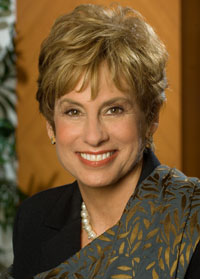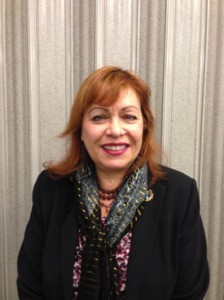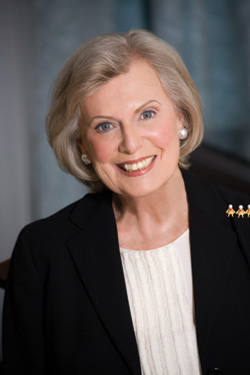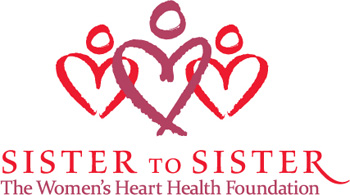Hadassah
Inside Look
Inside Hadassah: Sister to Sister
 Did you know that heart disease is the No. 1 killer of women? And did you know that it is in our power to change that fact? Irene Pollin, founder of the Sister to Sister Women’s Heart Health Foundation, believes that with all her heart, and now, a year into our second century, Hadassah and Sister to Sister are taking this mission global, empowering women through education of heart wellness and disease prevention. We will be reaching out to each and every Hadassah member, nationally and internationally. Each of us can learn our own personal risk factors, as well as what we can do to change these factors, by taking the short risk assessment featured on the Sister to Sister Web site. What an impact we can have, one woman at a time!
Did you know that heart disease is the No. 1 killer of women? And did you know that it is in our power to change that fact? Irene Pollin, founder of the Sister to Sister Women’s Heart Health Foundation, believes that with all her heart, and now, a year into our second century, Hadassah and Sister to Sister are taking this mission global, empowering women through education of heart wellness and disease prevention. We will be reaching out to each and every Hadassah member, nationally and internationally. Each of us can learn our own personal risk factors, as well as what we can do to change these factors, by taking the short risk assessment featured on the Sister to Sister Web site. What an impact we can have, one woman at a time!
Baring It for Hadassah
The members of Hadassah’s Charlotte, North Carolina, Chapter made a splash late last year when they dreamed up a creative way to raise money for breast cancer research at Hadassah Medical Center—and at the same time empower themselves.
The women—approximately 100 cancer survivors, loved ones of survivors or caring community members—participated in the two-part “Celebrate the Ta Tas” event. The first part, in October, involved having artists paint vivid scenes on the women’s breasts, scenes contributed by the women themselves. Then photographers, all women, snapped pix of their painted “ta tas”—from chin down and navel up—so that the images could be displayed at a fundraiser held in November at the Butter nightclub in Charlotte. The artworks were auctioned off and a record amount of money was raised.
The story behind the event is the story of Hadassah: passion paired with pragmatism. Charlotte-area member Talia Goldman was looking for a new way to raise awareness about breast cancer. “My mother is a four-time cancer survivor, my best friend as well, along with many other women I adore,” Goldman says. She had learned about a variation of the program from a friend and presented the idea to Hadas Kasher, Charlotte Chapter president.
“It was a unique way to express our concern for those affected with breast cancer and to honor women through inspiring works of art,” explains Kasher.
Goldman and Kasher started small, hoping to find 10 women willing to participate. The end result was overwhelming: The chapter was able to raise 10 percent of its annual goal at this single event. The Charlotte Chapter is now willing to create a “program in the box” to help other chapters interested in creating similar initiatives.
New Treatment for Liver Cancer
Doctors at Hadassah Hospital in Jerusalem recently performed a first-in-Israel groundbreaking operation on a liver cancer patient.
A cancerous growth in the liver has always been considered fatal, but now there is hope that this new method, called irreversible electroporation and which uses high-voltage electric currents to blast the tumor, could provide a cure. Liver cancer patient Louis Saznovsky, 55, was the first Israeli to receive the treatment.
“The method does not generate excessive heat or cold in the body, and can therefore be applied close to blood vessels and vital organs without harming them,” said Dr. Mohamed Faroja, a senior surgeon at Hadassah Hospital who learned the procedure while at Hammersmith Hospital in London.
Drs. Nahum Goldberg and Liat Appelbaum from Hadassah’s Imaging Institute assisted on Saznovsky’s operation, which is considered a complete success.
“Already on the day after the operation we knew it was successful and there were only a few scars where the tumor once was,” Saznovsky said. “I feel good today and have even gone back to work.”
Meet the Veep: Roni Schwartz

Roni Schwartz attributes her Zionist identity to Hadassah. Finding her love and commitment to Israel took a circuitous route. Seeds were planted, but took many years to take root, grow, blossom and bear fruit.
At ages 11 and 12 she attended Camp Young Judaea in New Hampshire. There she learned about the magic of Shabbat, Israeli dancing, the Maccabi games and what she calls, “Israeli stuff.” However, as a teen and young woman, visiting the State of Israel just didn’t resonate with her.
Fast-forward several years: Married to Michael and mother of Sari, Jeremy and Joshua, Schwartz realized that their children were only young for a short while. She decided to leave her job. On the evening after her last day of work, Schwartz accepted an invitation to the young women’s Park Slope, Brooklyn, Region Hadassah meeting. She walked into a room with 15 women and declared, “I feel so good; I just quit my job.” Thirty eyes turned to her.
By the end of the evening she was on a committee; then Susan Zimmerman, National Board member and her future mentor, asked her to be president of the Park Slope Chapter. Under her leadership the chapter thrived, becoming the place for young women throughout Brooklyn.
Schwartz reconnected with Young Judaea when Joshua was on Year Course. A Young Judaea family mission to Israel opened the door for her. However, everything came together when she became president of her region and joined her fellow presidents from throughout the United States on their mission to Israel. The more she learned about Israel, the more she felt a part of the land and the people.
Today, Schwartz strongly advocates for Hadassah to bring young women to Israel. She is national coordinator of the Young Judaea Division—she and Michael are Founders in Young Judaea—and sits on the inaugural board of directors of the now-independent nonprofit.
The Online Address for All Things Hadassah Hospital
Looking to learn more about the Hadassah Medical Organization, chiefly its two state-of-the art Jerusalem hospitals? Then check out HMO’s brand new, user-friendly website, available in English. In addition to departmental information, the site has the latest news on HMO’s world-renowned, cutting-edge research initiatives; health tips; how to seek medical help at Hadassah as an international patient; plus videos and nutritious recipes. Enjoy your visit to our new site today!
Hadassah Cardiac Wellness Institute
When Irene Pollin wanted to go international with her crusade to teach women about taking care of their hearts, Hadassah Medical Organization was her first stop.

Photo courtesy of Sister to Sister.
Thirteen years ago, the psychiatric social worker and author founded Sister to Sister, dedicated to increasing awareness among women about heart disease—the No. 1 killer of women worldwide—by providing screenings and educating women about lifestyle changes that can reduce their risks.
After growing the organization in the United States, last November, Pollin announced a $10-million gift to establish the Linda Joy Pollin Cardiovascular Wellness Institute at Hadassah Hospital in Jerusalem.
“Heart disease knows no boundaries,” says Pollin, “and neither will we. Hadassah Hospital treats Israelis and Palestinians together. What a terrific place to reach out across boundaries.”
For Pollin, heart health is a subject very close to home: She and her late husband, Abe, lost two children to congenital heart problems. (The institute is named in memory of their daughter, who died at age 16.) “If you’re lucky enough to be born with a healthy heart,” she says poignantly, “you should take care of it.” The unique aspect of heart disease, Pollin explains, is that “in contrast to other diseases, it is preventable and reversible.” She stresses that the focus of women’s heart health now is not research, but getting women to change behaviors that are already known to be harmful.
The new institute in Jerusalem will be headed by Dr. Donna Zfat-Zwas, a Harvard-trained cardiologist who came to Hadassah five years ago when she made aliya.
“We see this first as a flagship women’s cardiology center in Israel,” says Dr. Zfat-Zwas. “We will put this aspect of cardiology on the map here.” The center will include a clinic at the hospital to serve both Hebrew- and Arabic-speaking high-risk patients as well as reaching out to those not identified as high risk through its Web site, community programs and social media.
Initially, Pollin intended to work with HMO in Israel, but she was thrilled to become acquainted with the full force of Hadassah—a network of over 300,000 throughout the United States.
“For a century,” says Pollin, “Hadassah’s inclusive approach to women’s health has broken down barriers and saved countless lives. Ours is a natural partnership, one built on a common notion of universal sisterhood. I’m thrilled that our lifesaving work will be amplified by Hadassah and the organization’s vast reach and expertise.”
 Nancy Falchuk, chair of the Hadassah-Sister to Sister cardiac wellness initiative, agrees that the relationship is an organic one. “Who better to partner with than Hadassah,” she says. “What an impact we can have together!”
Nancy Falchuk, chair of the Hadassah-Sister to Sister cardiac wellness initiative, agrees that the relationship is an organic one. “Who better to partner with than Hadassah,” she says. “What an impact we can have together!”
She adds that, generally, women’s health centers don’t focus on cardiology. “It’s usually OB/GYN or breast health,” notes Falchuk, who is a nurse. “But heart health cannot be overlooked.”
Sister to Sister’s Web site includes a free heart-health assessment. Dr. Zfat-Zwas notes that the new center’s site is available in Arabic and Russian as well as Hebrew, to benefit women well beyond the borders of Israel.
Adds Pollin, “Technology has afforded us the ability to reach every corner of the globe.”








 Facebook
Facebook Instagram
Instagram Twitter
Twitter
Leave a Reply